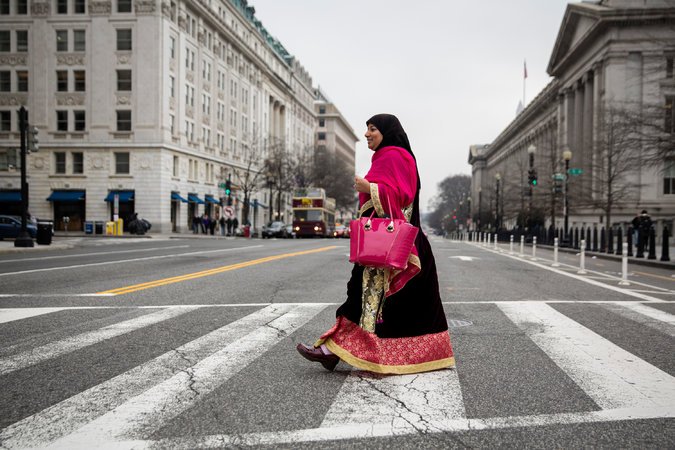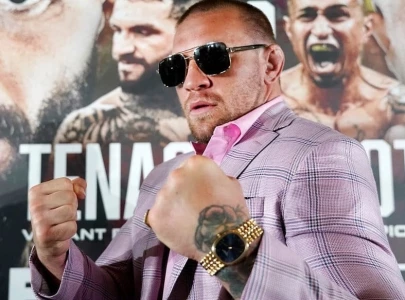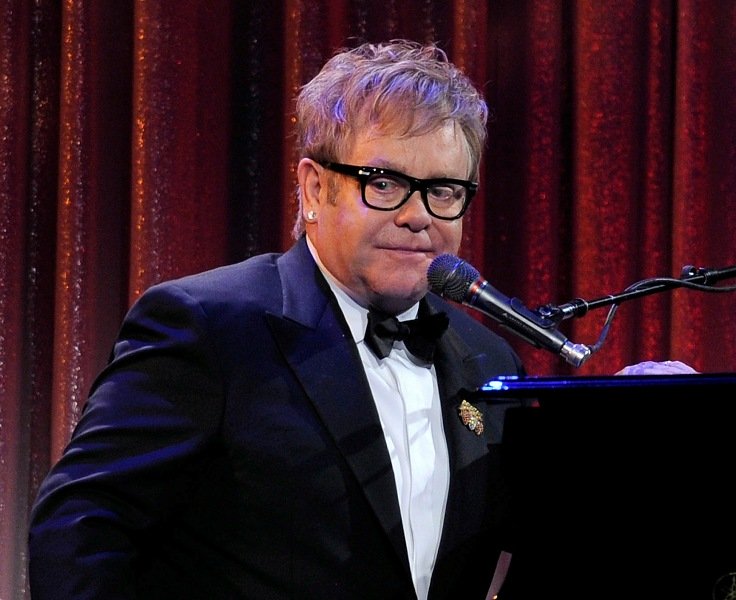
But then came a cellphone call with a request from Fox News to be interviewed about the sexual assaults in Germany, which have been ascribed to Muslim refugees. While driving to a nearby studio, Ms Ahmed strategized with a fellow passenger and frequent ally, the Rev Patrick J Mahoney, an evangelical minister with strong ties to the conservative establishment.
Muslim republican gives best response to Islamophobic discussion on Fox News
Their conversation ranged from a speaking opportunity for Ms Ahmed at an anti-abortion rally to the possibility of her appearing before the annual convention of the Conservative Political Action Committee, provided she would not be heckled in front of cameras. The two of them also prepared for an afternoon call to Donald J Trump’s campaign manager to propose that Mr Trump, the Republican front-runner, meet with an interfaith delegation that included imams.
The day’s hurly-burly typified Ms Ahmed’s intriguing, improbable and perhaps ill-fated mission of attracting Muslim voters to the Republican Party. A relative newcomer to Washington with a mercurial political past, Ms Ahmed is the founder and leader of the Republican Muslim Coalition, a lobbying and advocacy group that has run straight into a wind tunnel of anti-Muslim invective from many Republican presidential candidates.
“Not only do I have to struggle against the Republicans, but I have to struggle against my own community,” said Ms Ahmed, 30, “because they’re so frustrated and demoralized by the front-runners. Republicans have lost their votes, lost their donations. We shouldn’t be the punching bags.”
Muslims defend Islam from being hijacked by ISIS
This kind of outcome would have seemed unimaginable 16 years ago. In the 2000 presidential election, an array of Muslim-American organizations endorsed the Republican nominee, George W. Bush, for president, and he won roughly two-thirds of the Muslim vote. That share essentially reflects the proportional divide between Muslims in the United States who are African-American, and reliable Democrats, and socially conservative American Muslims of Arab and South Asian heritage, who typically leaned Republican.
After the September 11, 2001, terrorist attacks — and despite President Bush’s supportive visit to a Washington mosque days later — many Muslim voters rushed into the waiting arms of Democrats as the Bush administration waged wars in Iraq and Afghanistan, pushed through the Patriot Act and authorized widespread surveillance of Muslim neighborhoods and institutions. In the 2008 election, Barack Obama won an estimated 90 percent of the Muslim vote.
As if that slanted result did not make M. Ahmed’s task formidable enough, the 2016 presidential primary campaign has made the Bush years look like a paradise of tolerance. Mr Trump has called for a temporary ban on foreign Muslims entering the United States, and the rest of the field has been drawn into a verbal arms race to appear just as strident.
Would consider closing some US mosques: Donald Trump
Enter Ms Ahmed. The child of Pakistani emigrants to Oregon and a patent lawyer by profession, she began her political career in the Portland area taking generally liberal positions. She addressed rallies against the Iraq and Afghanistan wars, and ran in the Democratic primary for a vacant congressional seat. She was also known to take up more contentious causes, even positing on National Public Radio that a young Muslim man accused of planning to bomb a Christmas-tree-lighting celebration in Portland in 2010 — he ultimately admitted the crime and was sentenced to 30 years in prison — had been “framed.”
With such a past, as well as her visibly pious manner, Ms Ahmed has drawn plenty of vitriolic detractors among anti-Muslim activists. She has been described as a “radical,” an “Islamic lobbyist” and “deception cloaked in the American flag.” (The last one referred to her appearance on Fox News wearing a stars-and-stripes hijab.)
Ms Ahmed traced her partisan realignment to her experience lobbying in Oregon for the overturning of a 1923 law barring teachers from wearing religious attire. The bill passed in 2010 with bipartisan support, and it was Ms Ahmed’s first sustained exposure to faith-based advocacy groups from the Christian right. Her own social and economic conservatism — opposed to abortion, same-sex marriage and the Affordable Care Act — meshed with the kind of Republicans she was meeting.
And, to be honest, there was a gaping vacuum to be filled, given the way the national Republican Party had alienated once-loyal Muslim voters. The migration was compounded by a generational shift, as young American-born Muslims turned more liberal on social issues.
Muslim man confronts Ben Carson over anti-Islam comments
Within the orbit of Muslim-American activists, Ms Ahmed has earned a combination of head-scratching and credibility. Although she says the Republican Muslim Coalition has a $2.5 million annual budget and intends to start local chapters, it appears very much to be a one-woman show. Yet it is also clear that she has rapidly made herself known in influential corners of the conservative universe.
“It’s actually very healthy for some Muslims to remain in the Republican Party, because they act as a counterweight to Islamophobia,” said Robert McCaw, manager of the government-affairs department at the Council of American-Islamic Relations, a civil rights group. “And I think she’s useful for the party. While they benefit from fringe voters’ animosity toward Muslims, they don’t want to be publicly perceived by the majority of Americans as being racist and exclusionary.”
Khurrum Wahid, the founder and chairman of Emerge USA, an American Muslim lobby active in swing-state elections, made a similar point: “Without Muslims at the Republican Party table, Muslims who identify with the issues of the broader American Muslim community, there can be no progress nationally on issues such as Islamophobia.”
In that pursuit, Ms Ahmed faces problems beyond the Republican Party’s prevailing mood. The killing last month of 14 people in San Bernardino, California, by a married Muslim couple both provoked and ratified fears that even those American Muslims who appear to be living successful lives — college degree, solid occupation, house, new baby — could secretly be terrorists.
Republican candidate Carson says Muslims unfit to be US president
“It’s gotten a lot harder for me since San Bernardino,” Ms Ahmed said, “because the whole image of Islam gets tarnished.”
If there is any hope for a political quest that looks pretty hopeless right now, history offers it. America interned Japanese-Americans during World War II and came to repent for it. The 1928 presidential campaign of Al Smith endured more overt bigotry — in that instance against Catholics — than any before or since, and yet Catholics now reside comfortably in the American mainstream.
“A lot of American Muslims are saying that, at the end of the day, Americans do get beyond the bigotry and animosity,” said Farid Senzai, a political scientists at Santa Clara University, “and that it’s just a matter of time before this phase passes.”
Perhaps, then, Ms Ahmed can win by playing the very long game.
This article originally appeared on The New York Times, a partner of The Express Tribune.



1732259077-0/carti-(1)1732259077-0-165x106.webp)













COMMENTS
Comments are moderated and generally will be posted if they are on-topic and not abusive.
For more information, please see our Comments FAQ